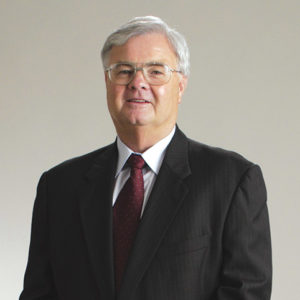calsfoundation@cals.org
Clement Sampson Walls Jr. (1947–)
Clement Sampson Walls Jr. is an Arkansas businessman, entrepreneur, and financier who was the longtime chief executive officer (CEO) of Arkansas Capital Corporation (ACC) and led the nonprofit business finance firm through its greatest period of expansion since its founding in 1957.
Clement Sampson Walls Jr. was born in Little Rock (Pulaski County) on July 8, 1947, to Clement Sampson Walls Sr. and Eva Jane Watson Walls. His father worked as a truck driver, and his mother was a licensed practical nurse (LPN). His maternal grandfather was John Reaves “Mule” Watson, a pitcher in the major leagues from 1918 to 1924 who played for the Boston Braves, the Philadelphia Athletics, the Pittsburgh Pirates, and the New York Giants.
Walls’s parents divorced when he was ten, and he worked several part-time jobs to help support the family while attending school. Describing himself as a “cradle Catholic,” Walls graduated from Catholic High School in 1965 and earned a degree in political science from Little Rock University (now the University of Arkansas at Little Rock) in 1968 with the intention of entering law school. That same year, Walls married Donna Sue Leird of Little Rock, the daughter of a home developer who was a close associate of Arkansas Power & Light President C. Hamilton Moses; they had two sons, Sam III and Marcus. As part of a U.S. Army Reserve unit in Little Rock, Walls was scheduled to enter six months of training for active duty in late 1968, but the draft was frozen later that year, and President Richard Nixon canceled draft calls on September 19, 1969.
Having decided against law school after his marriage and his brief military obligation, Walls worked multiple jobs until the fall of 1968, when he was hired in the credit department of Dillard’s Department Stores. Walls worked his way up the management ranks and was active in the company’s computerization of management information systems, particularly in the realm of inventory management. In July 1976, Walls established Handy Sam, Inc., what he described as a “consumer-oriented hardware store” located on Asher Avenue in Little Rock. After selling Handy Sam in 1984, Walls spent the next five years variously in the trucking business, as a representative in entrepreneurial development for the University of Arkansas (UA) in Fayetteville (Washington County), and in a cat litter venture.
During his time at UA, Walls became acquainted with George Eagen, then executive vice president of Arkansas Capital Corporation. After learning more about the company, which was described at the time as “Arkansas’s best kept secret,” Walls accepted Eagen’s offer to join ACC as vice president and assistant secretary-treasurer. Act 567 of 1957, which created ACC, emphasized “the creation of employment opportunity as a primary goal.” Walls sought to fulfill co-founder Herbert Thomas’s vision for ACC, which had been stifled by bureaucratic inertia and lack of vision. Walls was able to accelerate his efforts after Eagen’s retirement in November 1990, when he became executive vice president; he later became CEO. Through two programs offered by the Small Business Administration, the 7(a) Loan Guarantee Program and the 504 Loan program, Walls was able to expand ACC’s reach and impact.
Walls saw that a barrier for Arkansas entrepreneurs had long been the lack of capital for fixed assets, primarily for startup enterprises, and he created Six Bridges Capital Corporation to become ACC’s primary conduit in the SBA 504 loan program. The company’s loan portfolio increased from $13.289 million in 1993 (ACC’s thirty-fifth anniversary year) to $16.028 million in 1994, while ACC’s total assets went from $16.975 million to $21.566 million, a 13.5 percent increase. By 1995, this total hit $32.136 million, a forty-nine-percent increase. From the end of 1994 to the end of 1995, the percentage of participation of Arkansas’s banks in ACC’s loan portfolio increased from twenty-one percent to twenty-eight percent, reflecting a growing client base under Walls’s tenure. ACC also led off in the venture capital effort with the creation of Diamond State Ventures in 1999, which focused on the company’s emphasis on small- to medium-sized entrepreneurs.
Under Walls’s leadership, ACC loans helped businesses purchase real estate; undertake construction projects; provide working capital; refinance existing debt; and acquire machinery, equipment, fixtures, and furnishings. During the period Walls led the ACC, the corporation made 376 loans producing total proceeds to businesses of over $103.3 million. Those loans, in turn, supported projects that, by 2003, constituted a total value of $216.4 million.
The 2014 Arkansas Governor’s Cup established the C. Sam Walls Entrepreneur Educator Award, the result of a grant from the Donald W. Reynolds Foundation to honor Walls for single-minded dedication entrepreneurial education in Arkansas. After Governor Mike Beebe signed the Connect Arkansas Broadband Act of 2007, Walls led ACC to create a plan to educate Arkansans about the internet, expand access to it, and help larger numbers of people (including small entrepreneurs) apply it to everyday needs.
On July 11, 2013, Walls retired as CEO and was succeeded by Rush Deacon as CEO and by his son, Sam Walls III, as chief operating officer. Walls lives in Little Rock with his wife, Donna, and remains active in entrepreneurial education efforts.
For additional information:
The Arkansas Capital Corporation Group: An Asset to Arkansas since 1957. 2003 Annual Report, April 30, 2003.
Lancaster, Bob, ed. Arkansas Times Almanac of Arkansas History. Little Rock: Arkansas Times, 2000.
Smith, David. “Nonprofit Lender Fosters State Jobs.” Arkansas Democrat-Gazette, August 7, 2002, pp. 1D, 6D.
Revis Edmonds
Arkansas State University
 Business, Commerce, and Industry
Business, Commerce, and Industry Divergent Prosperity and the Arc of Reform, 1968–2022
Divergent Prosperity and the Arc of Reform, 1968–2022 Sam Walls
Sam Walls 




Comments
No comments on this entry yet.